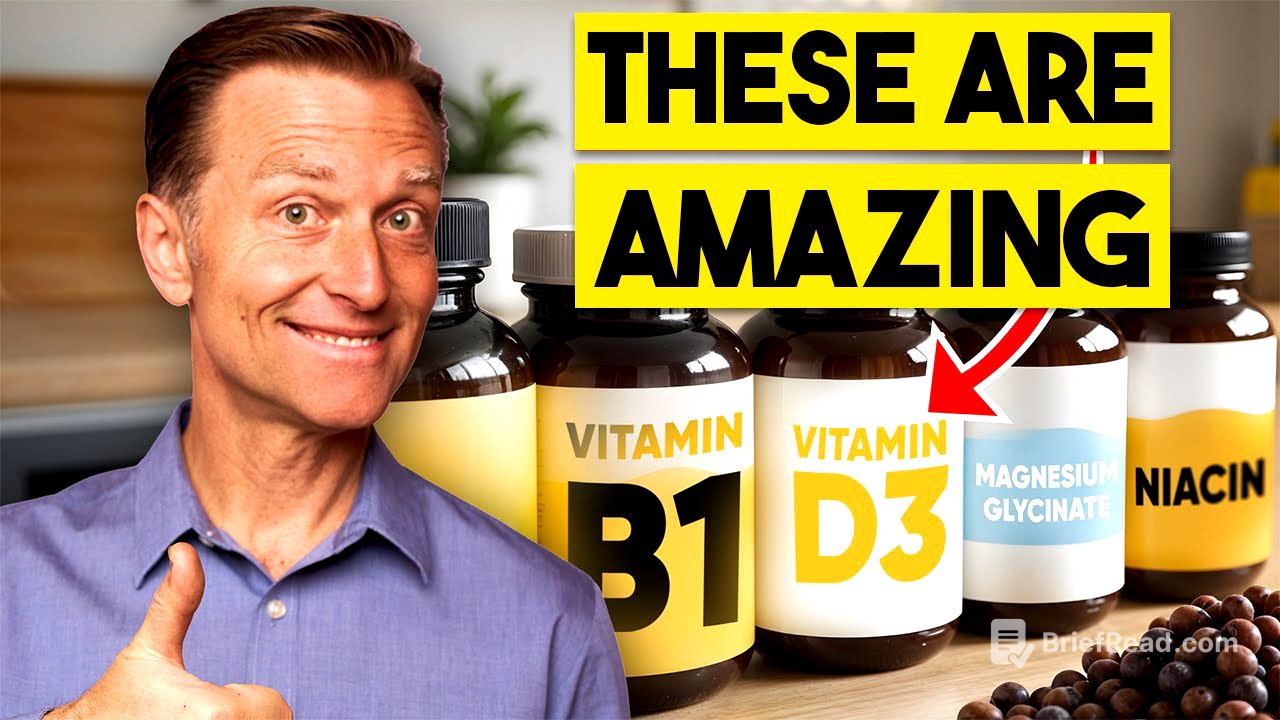TLDR;
This video provides a detailed overview of specific supplements and their benefits for various health conditions. Dr. Berg emphasizes the importance of understanding how supplements work based on experience and the mechanics of nutrition, rather than solely relying on potentially biased research. He covers supplements like Vitamin D, Magnesium, Betaine Hydrochloride, and others, explaining their uses for conditions ranging from autoimmune diseases to digestive issues.
- Vitamin D is crucial for autoimmune diseases, depression, and eye problems.
- Magnesium glycinate is essential for muscle relaxation, preventing kidney stones, and improving sleep.
- Betaine hydrochloride aids digestion by increasing stomach acid.
Introduction: Best supplements for health conditions [0:00]
Dr. Berg introduces a discussion on the best supplements for specific health conditions, highlighting the importance of this information for potential future health issues. He cautions against relying solely on evidence-based research due to potential biases and funding issues that may invalidate natural remedies. Instead, he bases his recommendations on personal experience, observations from working with numerous individuals, and a deep understanding of nutritional mechanics.
Vitamin D benefits [1:39]
Vitamin D is essential, especially given common resistance to its absorption due to factors like lack of sunlight, age, weight, and insulin resistance. High doses of Vitamin D3, ranging from 10,000 to 50,000 IUs daily, can override these issues. Vitamin D is particularly effective for autoimmune diseases by reducing inflammation and regulating the immune system. It also benefits conditions like cancer, AIDS, depression, glaucoma, and bone pain. Additionally, high doses of Vitamin D3 can significantly improve various inflammatory skin conditions and address hair loss. It's crucial to take co-factors like magnesium, zinc, and vitamin K2 when supplementing with Vitamin D.
Magnesium glycinate [3:39]
Magnesium glycinate is recommended for its superior absorption. It works synergistically with Vitamin D, enhancing its effects. Magnesium deficiency can cause early morning issues like cramps, increased heart attack risk, and elevated blood sugar. Higher doses of magnesium, up to 1,000 mg, can alleviate migraine headaches. Magnesium also lowers cortisol and adrenaline, promoting better sleep, thinning the blood, and preventing clotting. It serves as an electrolyte to prevent atrial fibrillation and supports energy production in the mitochondria, combating chronic fatigue. Adequate magnesium intake is indicated by relaxed muscles and helps prevent kidney stones.
Betaine hydrochloride [6:06]
Betaine hydrochloride is recommended for heartburn or indigestion, as it increases stomach acid. This helps the valve between the stomach and esophagus to close properly, improving digestion. Multiple capsules may be needed before a meal to achieve the desired effect.
Zinc carnosine [6:40]
Zinc carnosine is highlighted as the best remedy for stomach ulcers and for calming gastritis.
Selenium [6:50]
Selenium is beneficial for individuals with AIDS, as it helps fix certain T-cells, and for those with Hashimoto's, an autoimmune thyroid problem. A single Brazil nut daily can provide a good amount of selenium.
Vitamin B1 [7:32]
Vitamin B1 requires magnesium as a co-factor to work effectively. It is an excellent remedy for nervous tension, worry, stress, anxiety, and restless leg syndrome. Benfotiamine, a fat-soluble form of B1, is particularly effective for nerve issues in the peripheral parts of the body, such as the feet and hands.
Calcium lactate [8:21]
Calcium lactate is mentioned for treating chronic coughing. However, Dr. Berg advises against high doses of calcium supplements (over 1200-1500 mg) due to the risk of heart problems, recommending obtaining calcium from food sources like cheese, vegetables, and sardines.
Iron [8:48]
Dr. Berg advises against iron supplements, suggesting obtaining iron from food sources like red meat and liver, or through liver pills, which are also beneficial for low blood pressure and energy.
Potassium [8:58]
Potassium is recommended for individuals sensitive to salt, advising an increase in potassium intake rather than lowering salt. The recommended daily intake of potassium is 4700 mg, which is difficult for most people to achieve.
Coenzyme Q10 [9:15]
Coenzyme Q10 is essential for individuals taking statins, as statins deplete this coenzyme.
Tocotrienols [9:25]
Tocotrienols, a form of Vitamin E, are recommended over other forms due to being 50 times stronger. They are effective in preventing fibrosis, treating angina, supporting artery health, and addressing infertility.
TUDCA [9:45]
TUDCA, a specialized bile salt, is beneficial for individuals with thickened bile, relieving pressure and pain that radiates to the right shoulder and neck. It also supports neurological health.
Iodine [10:07]
Iodine is recommended for fibrocystic breasts, as it regulates excess estrogen, which causes cysts.
Vitamin C [10:20]
Vitamin C is beneficial for collagen production, particularly for bleeding gums, indicating inflammation.
Probiotics and biotin [10:30]
Probiotics are recommended for individuals who consume a lot of diet soda, as artificial sweeteners can disrupt gut health. Biotin is beneficial for hair, nail, and skin growth.
Manganese and NAC [10:44]
Manganese is good for treating Tourette's and tics. NAC (N-Acetyl Cysteine) is a supplement that is helpful if someone has taken too much Tylenol. It's also beneficial for treating poisoning of the liver, snake bites, and poisonous mushrooms.
Mastic gum and melatonin [11:00]
Mastic gum is good for gastritis. Melatonin is recommended for severe sleep problems when other remedies have failed.
Niacin [11:22]
Niacin is beneficial for cholesterol management. Higher doses, such as 500 to 1,000 mg, are recommended, and the flush response is normal.
Clove oil [11:35]
Clove oil is great for pain relief in the teeth or gums.









